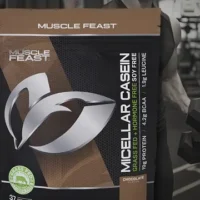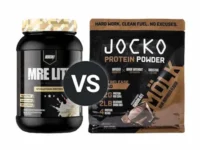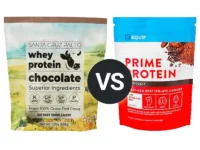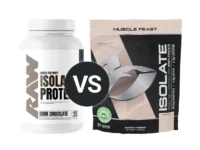Knowledge BaseYou're Questions Answered
BACK
Are protein shakes low carb?
Whether protein shakes are low-carb depends on the specific product and formulation. Protein shakes can be designed to fit various dietary needs, including low-carb diets, but it's essential to check the product label for detailed nutritional information.
Types of Protein Shakes and Their Carb Content
- Whey Protein Isolates: Often lower in carbs, often contain as little as 1 gram of carbohydrates per serving. These are ideal for those on strict low-carb or ketogenic diets1.
- Casein Protein: Similar to whey, casein protein shakes are generally low in carbs, although the content can vary slightly depending on the brand and flavor2.
- Plant-Based Proteins: Proteins derived from sources like pea, hemp, or rice may have higher carb content due to the natural carbohydrates found in plants. However, some plant-based protein powders are specially formulated to be low in carbs3.
- Meal Replacement Shakes: These often contain more carbohydrates because they are designed to replace a full meal and provide balanced nutrition, including energy from carbs4.
Choosing a Low-Carb Protein Shake
- Read Labels Carefully: Always check the nutrition facts panel to see the exact carbohydrate content per serving.
- Consider Your Dietary Goals: If you're following a low-carb or ketogenic diet, look for shakes that are specifically marketed as low-carb. These products typically contain additional fats and minimal carbs to align with ketogenic nutritional needs.
- Avoid Added Sugars: Some protein shakes might include added sugars or high-carb ingredients like fruits, which can increase carbohydrate content. Opt for shakes with natural sweeteners or no added sugars.
Our protein powder reviews and protein comparisons provide a percentage of the total carb content of a product. Low-carb protein powders typically have less than 5% carb content, though can have as little as zero carbs.
Was this answer helpful? Let us know!
Like
References:
- Phillips, S. M. (2014). A brief review of higher dietary protein diets in weight loss: a focus on athletes. Sports Medicine, 44(S1), S149-S153.
- Hoffman, J. R., & Falvo, M. J. (2004). Protein – Which is Best? Journal of Sports Science and Medicine, 3(3), 118-130.
- Kalman, D. S. (2014). A review of the effects of protein source on exercise performance and recovery. Journal of the International Society of Sports Nutrition, 11(1), 20.
- Kreider, R. B., Wilborn, C. D., Taylor, L., Campbell, B., Almada, A. L., Collins, R., Cooke, M., Earnest, C. P., Greenwood, M., Kalman, D. S., Kerksick, C. M., Kleiner, S. M., Leutholtz, B., Lopez, H., Lowery, L. M., Mendel, R., Smith, A., Spano, M., Wildman, R., Willoughby, D. S., Ziegenfuss, T. N., & Antonio, J. (2010). ISSN exercise & sport nutrition review: research & recommendations. Journal of the International Society of Sports Nutrition, 7, 7.
Add to this Answer
Related Questions

Disclosure
Your Answer
Do you have a suggestion to improve the answer? Please detail your suggestions and provide any references to information that may support your answer if available.
The content on this site has not been written, reviewed or endorsed by a medical professional. We assume no liability for the misuse of supplements and recommend you review the label of any product, as well as consulting with your health care professional.
We are a participant in the Amazon Services LLC Associates Program, an affiliate advertising program designed to provide a means for us to earn fees by linking to Amazon.com and affiliated sites.
We are a participant in the Amazon Services LLC Associates Program, an affiliate advertising program designed to provide a means for us to earn fees by linking to Amazon.com and affiliated sites.
© 2026 ProteinPowder.com






